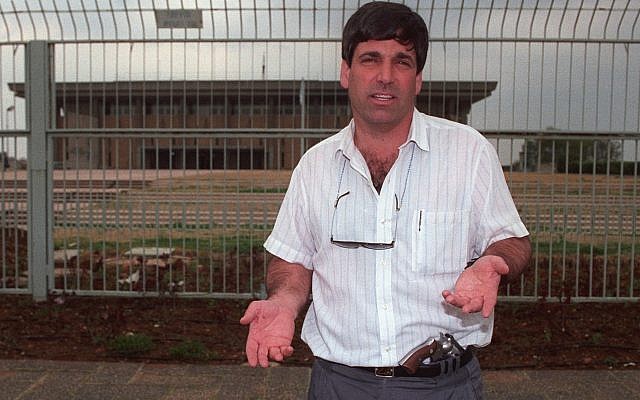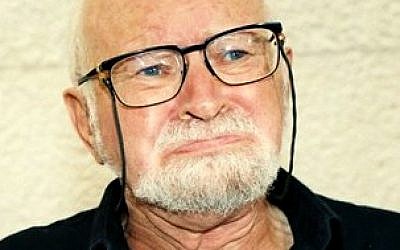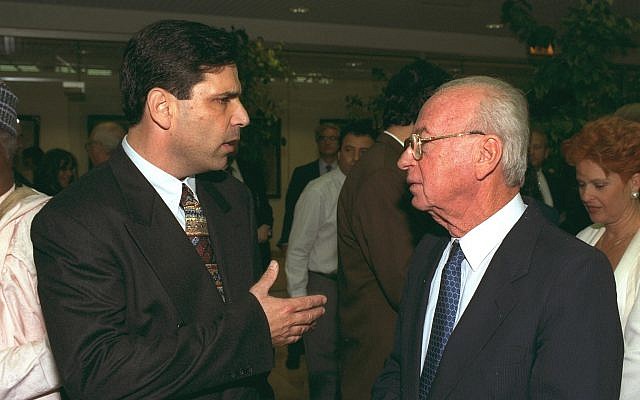Justice Ministry official says capital punishment an option in Gonen Segev’s case, but would be an ‘unprecedented penalty’ for espionage

Former minister Gonen Segev — found guilty of drug smuggling in 2006 — has for years been a source of ridicule, his name usually only brought up in public discourse as a comparison with other loud-mouthed rule-breaking lawmakers.
But charges announced Monday alleging that he engaged in espionage against Israel for arch-foe Iran could see him facing much stiffer penalties than the three years he served in prison a decade ago.
If Segev is found guilty of handing information to Iran — as alleged in an indictment revealed by the Shin Bet security agency Monday — he could face either the death penalty or up to life imprisonment, legal sources told The Times of Israel following the bombshell announcement.
Segev, who served as infrastructure and energy minister between 1995-1996, provided Tehran with information about locations of security centers and Israel’s energy industry, the Shin Bet said. As somebody who sat in government meetings and headed ministries dealing with energy and national infrastructure, Segev would have had access to sensitive material during his time as a politician, though it is unclear how damaging the information would have been 20 years later.
The ex-minister is also accused of making contact with Israeli figures in security, defense and diplomacy, in order to mine them for information to send to Iran. According to the Shin Bet, he tried to make direct connections between his Israeli contacts and Iranian handlers, presenting the spies as businesspeople.

He is also said to have met with his Iranian handlers in hotels and safe houses around the world and used a special encrypted device to send them messages in secret. He even allegedly traveled to Iran twice in order to divulge security secrets.
After having been extradited to Israel from Equatorial Guinea last month, he was indicted in a Jerusalem court on charges of assisting the enemy in wartime, spying, and a number of other related crimes.
While Segev was sentenced to a relatively short five year prison sentence for his drug smuggling conviction (which was cut by a third for good behavior), the Israeli legal system is unlikely to treat his latest apparent crimes nearly as lightly.

“Even the death penalty is an option,” said Michael Sfard, an Israeli lawyer and political activist specializing in international human rights law and the laws of war.
“Espionage is in its own category according to Israeli law, the most serious punishment is available,” added Sfard, who co-authored the biography of the Soviet spy Marcus Klingberg, perhaps the most damaging spy in Israel’s history, with Klingberg himself.
From 1957, Klingberg, deputy director of the top-secret Israel Institute for Biological Research at Ness Ziona, south of Tel Aviv, and a professor of epidemiology at Tel Aviv University, passed information about Israel’s chemical and biological activities to the Soviet Union.
Charged with spying for the KGB for three decades, Klingberg served 20 years in prison, the first 10 in solitary confinement.
Segev could end up with a similar sentence, or worse.
“He’s facing a life sentence or death penalty for the crime of aiding an enemy in a time of a war, and 15 years to life sentence for espionage,” said Nitsana Darshan-Leitner, president of Shurat HaDin — Israel Law Center, a Tel Aviv-based non-governmental organization whose aim is to put terror organizations out of business.
“Giving information is 15 years, giving confidential information is life,” she added.
Only one person has ever been put to death after a death sentence by a standing Israeli court: Nazi officer Adolf Eichmann, one of the architects of the Holocaust. (Eichmann was convicted on 15 criminal charges, including crimes against humanity, war crimes, and crimes against the Jewish people, and was sentenced to death on June 1, 1962.) In 1948, the country put to death Meir Tobiansky for treason, after a field court martial, the first and only execution of an Israeli.
(John Demjanjuk was convicted of war crimes and crimes against humanity, and sentenced to death in 1988. But five years later Israel’s Supreme Court unanimously ruled Demjanjuk was not death camp guard “Ivan the Terrible,” and overturned the 1988 verdict.)
However, the death penalty formally exists in Israeli law. It is technically allowed in cases of high treason, as well as in certain circumstances under the military law that applies within the IDF and in the West Bank.
A Justice Ministry official, speaking with the The Times of Israel, confirmed that the death penalty is an option for prosecutors to pursue in Segev’s case, but admitted it would be an “unprecedented penalty” for espionage.
Segev, who served as a minister between January 1995 and June 1996, seems to be the highest-ranking Israeli official ever charged with being a spy. But he joins a long list of senior officials, including MKs and top army brass, who have been charged with treason through the decades.

Segev has reportedly admitted to Shin Bet investigators that he was in contact with Iranian intelligence officials, but claimed his alleged espionage on behalf of the Islamic Republic was actually an effort to help Israel. The Shin Bet was reported not to believe him.
During his interrogation, Segev reportedly told investigators that he had no ideological or financial motive in helping Iran, and that he did not hand over any classified information.
Segev’s lawyers said in a statement to the press that the full charge sheet painted a “different picture” from that which can be seen from only the parts cleared for publication.
As reported by The Times of Israel
